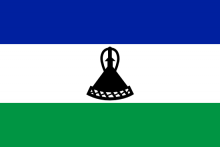Lesotho is a small Commonwealth state with a largely rural population of over 2.3 million (World Bank, 2022).
COL’s work in Lesotho is in the areas of higher education and technology-enabled learning, and more recently, open schooling. Lesotho is a part of the Virtual University for Small States of the Commonwealth (VUSSC) network and benefits from programmes offered by COL’s regional centre, the Southern African Development Community’s Centre for Distance Education (SADC-CDE) at Botswana Open University. Learners from Lesotho are also participating in COL’s free online courses and other openly available resources.



